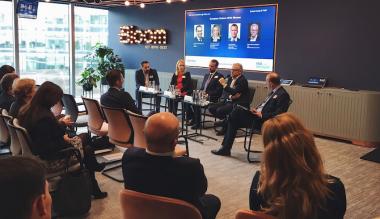Competition hots up as SA Property Investors discover value in CEE
 South Africans are gunning for real estate assets in Central and Eastern Europe (CEE), delegates heard at Investment Briefings’ CEE and Europe Outlook Briefing, which was held in Warsaw recently.
South Africans are gunning for real estate assets in Central and Eastern Europe (CEE), delegates heard at Investment Briefings’ CEE and Europe Outlook Briefing, which was held in Warsaw recently.
Central and Eastern Europe (CEE) offers a number of opportunities for property buyers, and South Africans are competing successfully with global Investors — SA Commercial Prop News has learned.
A number of JSE-listed property funds like Resilient Reit, Growthpoint Properties, Accelerate Property Fund and Redefine Properties have gone big acquiring assets in the region.
According to Real Asset Insight report, they has been intense competition between foreign and domestic investors in CEE gunning for real estate assets.
Foreign investors from many countries around the world, from South Africa, Canada, South Korea and Philippines, are deploying more capital in CEE and actively competing with domestic rivals for assets, delegates heard at Investment Briefings’ CEE and Europe Outlook Briefing, which was held in Warsaw recently.
‘We finally have a pool of diversified investors from various regions, from South Africa to Asia, it is no longer just Germany or the UK,’ said Anna Duchnowska, senior director asset management, Invesco Real Estate. ‘A large Japanese bank came to see me in December and they also want to invest in Poland. It is a very good sign.’
Asian investors, who had been looking at the region for a while, are now actually deploying money and closing deals. They come from China and South Korea but also the Philippines. Americans are net sellers of retail assets, but they are buying logistics. South Africans have become a steady fixture of the market. Canadians and Australians are actively looking. The list goes on.
‘When you look at the make-up of capital now, it is wildly different from what it was five years ago and it has changed for the better,’ said Luke Dawson, Managing Director & Head of Capital Markets CEE, Colliers International. ‘We now have 5 or 6 pools of funds that are active in CEE. As we reach the top of the market, it bodes well that we have a wider and more stable investor base than we used to.’
Foreign investors still dominate the market in Poland and Romania, because there are no structures for locals to deploy capital, while in Hungary and the Czech Republic domestic investors have been increasingly active buyers, often outbidding cross-border rivals to get the best deals.
‘It is a pity that in Poland we have no domestic investors,’ said Duchnowska. ‘It is amazing to look at how quickly things have changed in the Czech Republic, to the point that now almost 50% of acquisitions are done by local investors. I really and truly believe it should happen in Poland, but without a change in the regulations it will be very difficult.’
In Poland over 90% of investments in real estate are done by foreign capital. ‘It is a huge problem for the country, as a lot of money is sitting in bank accounts instead of being deployed,’ said Janusz Dzianachowski, Attorney-at-law and Partner, Linklaters. ‘In the Czech Republic it is another world.’
Unfortunately there is little prospect of positive change, he said. ‘The problem with Poland is that it has a lot of frozen capital and no structures to invest,’ Dzianachowski said. ‘We have talked about REITs for years and nothing has really changed.’
For the situation to improve ‘there would have to be new legal structures to help people invest in real estate but above all there would need to be a big change in lawmakers’ mentality,’ he said. ‘I am not sure anything will happen anytime soon. I am quite pessimistic.’
South African Property Funds with CEE Exposure
In 2018, SA’s largest listed property company, Growthpoint Properties expanded into Poland.
The group made a voluntary announcement saying that it would participate in the issue of new ordinary shares by Polish company Griffin Re (GPRE). Growthpoint would invest between €120m (R1.77bn) and €150m (R2.2bn) via its subsidiary, Growthpoint Properties International.
Growthpoint first entered east Europe when it spent R2.7bn at the end of 2016 on a stake in Globalworth Real Estate Investment, a Romanian company.
Redefine Properties, SA’s fourth-largest property company, bought nine warehouses in Poland in eastern Europe for about R3 billion, marking its entry into that country’s logistics market.
The company also increased its stake in EPP, the largest owner of retail real estate in Poland, with over 40% after supporting a R700m bookbuild, which EPP used to help buy the King Cross Marcelin shopping centre in the Polish city of Poznan.
Resilient Reit owns various shopping centres in SA and stakes in the likes of Romanian retail player NEPI Rockcastle and Greenbay.
Nepi Rockcastle is the largest owner of shopping centres in the region with assets worth more than €5.8bn in nine countries.
Accelerate Property Fund joined a host of SA funds investing in central and eastern Europe, announcing a R2.3bn property deal that includes retail assets in Austria and Slovakia.

















